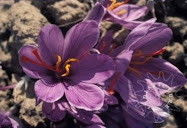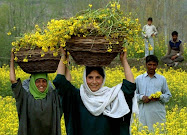 Kashmiri Pandits are celebrating their most revered festival “Hayrath” popularly known as Shivratri in the plains on 22nd of this month this year. Hayrath enjoys the highest social, cultural and religious importance with the community. The festival is celebrated on 12th or 13th day of the dark fortnight of the lunar month of Phalguna with high excitement and fervor but in fact the celebrations commence on the very first day of Phalguna Krishna Paksha called Huer-Ukdoh when extensive cleansing of the houses including all interiors and exteriors start. The married ladies visit their parents’ house invariably before the festival to have a ceremonial bath and collect some cash gifts for herself, children and husband. The main event is the auspicious ceremonial Hayrath Puja in the evening in which all the members of the family participate. Extensive arrangements are made for the pooja by collecting lots of materials, mainly walnuts, flowers, Kusha grass, sugar candy cones and some utensils of different size and shape especially meant for the purpose. Walnuts are especially significant in the Pooja. Various food preperations, as per the custom in the family are prepared for the offerings in the pooja and then taken as Prasad. A small room or part of a room is selected and cleaned for the purpose and a Pandit is called to perform the pooja which takes a couple of hours or even more. No food is tasted until the pooja is over. Since the Pandits have become very scarce now so the pooja is commonly performed by the eldest family member with the help of some books, Cassettes, CDs etc for the purpose.
Kashmiri Pandits are celebrating their most revered festival “Hayrath” popularly known as Shivratri in the plains on 22nd of this month this year. Hayrath enjoys the highest social, cultural and religious importance with the community. The festival is celebrated on 12th or 13th day of the dark fortnight of the lunar month of Phalguna with high excitement and fervor but in fact the celebrations commence on the very first day of Phalguna Krishna Paksha called Huer-Ukdoh when extensive cleansing of the houses including all interiors and exteriors start. The married ladies visit their parents’ house invariably before the festival to have a ceremonial bath and collect some cash gifts for herself, children and husband. The main event is the auspicious ceremonial Hayrath Puja in the evening in which all the members of the family participate. Extensive arrangements are made for the pooja by collecting lots of materials, mainly walnuts, flowers, Kusha grass, sugar candy cones and some utensils of different size and shape especially meant for the purpose. Walnuts are especially significant in the Pooja. Various food preperations, as per the custom in the family are prepared for the offerings in the pooja and then taken as Prasad. A small room or part of a room is selected and cleaned for the purpose and a Pandit is called to perform the pooja which takes a couple of hours or even more. No food is tasted until the pooja is over. Since the Pandits have become very scarce now so the pooja is commonly performed by the eldest family member with the help of some books, Cassettes, CDs etc for the purpose.Strangely the 21-day celebrations are marked by the same excitement, exultation and euphoria as in the days of yore in Kashmir. The way our displaced and uprooted brethren have been observing Hayrath in tents and makeshift tenements for the last 20 years shows how close this festival is to our hearts.
Hindus all over India and elsewhere observe Maha-Shivratri on the 14th day of the dark fortnight of the lunar month of Phalgun, a day after it is celebrated by Pandits in Kashmir, also known as Shiv-Chaturdashi. It is believed that Lord Shiva, the 'King of Yogis' and the 'Destroyer-Renovator of the Holy Trinity', manifested on earth on this day to redeem his devotees. The Hindus of all castes and creeds observe fast, offer prayers and spend the whole night in worship of Lord Shiva in homes and temples.
In fact Hayrath is different from Maha-Shivratri celebrated by Hindus in the plains. All the Chuturdashis of the dark fortnights of the year are auspicious to Lord Shiva and are called Shivratris except this one that falls in Phalguna being the most auspicious is called Maha-Shivratri. It’s a mere coincidence that Hayrath celebrated by Pandits in Kashmir falls only one day before Maha-Shivratri and is confused generally with Maha-Shivratri also called Shiva-Chaturdashi........ (to be continued)
In fact Hayrath is different from Maha-Shivratri celebrated by Hindus in the plains. All the Chuturdashis of the dark fortnights of the year are auspicious to Lord Shiva and are called Shivratris except this one that falls in Phalguna being the most auspicious is called Maha-Shivratri. It’s a mere coincidence that Hayrath celebrated by Pandits in Kashmir falls only one day before Maha-Shivratri and is confused generally with Maha-Shivratri also called Shiva-Chaturdashi........ (to be continued)
.jpg)




No comments:
Post a Comment